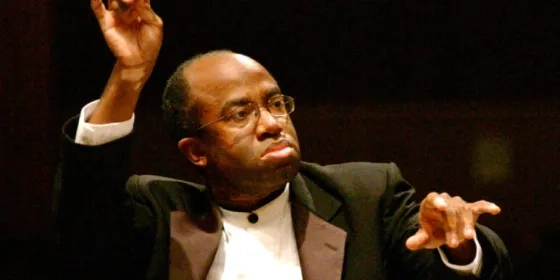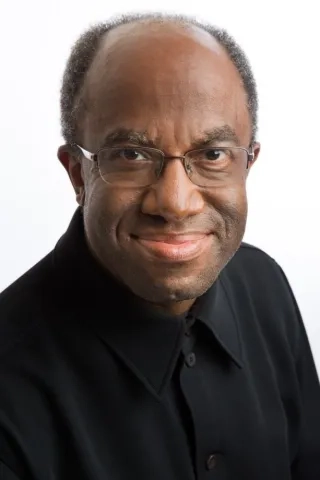Remembering Michael Morgan
Ahead of a performance dedicated to the maestro, faculty and students pay tribute to Music Director and conductor Michael Morgan and his long-standing contributions to the San Francisco Conservatory of Music and beyond.
Conductor, teacher, advocate, mentor, friend: the many words used to describe Michael Morgan are equaled by the mark he left on those studying and working at the San Francisco Conservatory of Music. The beloved musician died last month at age 63, but the lessons he taught are carried by countless individuals each day.
This Saturday, September 25, the SFCM Orchestra will perform its first concert of the season dedicated to the memory of Morgan. Conducted by SFCM Music Director Edwin Outwater and student conductor David Baker and featuring works by PaviElle French, Sarah Kirkland Snider, Samuel Barber, and Aaron Copland, the performance will be held at SFCM’s Caroline H. Hume Concert Hall in the Getty Center at 50 Oak Street and is open to the public.
In advance of the event, community members remember the maestro and his legacy.
A Maestro’s Mark on SFCM
Morgan began conducting at 12, and after a lengthy musical education and career, in 1991 he became the music director of the Oakland Symphony. His talents and expertise rose him to national prominence with guest appearances leading the top orchestras in Chicago, Baltimore, New York, Los Angeles, and San Francisco.
Morgan was also a regular partner and collaborator at SFCM. He led the SFCM Orchestra in concert several times a year, and was a beloved teacher and coach.
“Maestro Morgan’s dedication and engaging interpretation of anything he conducted was inspiring,” said Gabriel Anker, ‘21. Anker, a violin player and recent graduate of SFCM was concertmaster under Morgan for Mozart’s Symphony No. 29 and principal for Silvestre Revueltas' Homenaje a Federico Garcia Lorca. “I remember him searching for nuance beyond conventional beauty, for instance suggesting less vibrato from the strings in the Mozart.”
From the podium, those that worked with him describe Morgan as expressive and wholeheartedly devoted to the music, challenging the ensemble to aspire to be their best. SFCM Percussion Department Chair Jacob Nissly recently played a program with Morgan with the San Francisco Symphony where he is principal percussion. “I had the fortune of working with Maestro Morgan just this past July,” Nissly said. “It included a piece entitled ‘Charleston’ by James Johnson. I had a very involved improvised drum set part which is a specialty of mine. He helped keep the orchestra together during some of the more improvised sections that are not the most common in classical music.”
Morgan not only taught conducting at SFCM, but also collaborated often with faculty members where, over the years, co-workers became friends. “I always knew the amazing work Michael was doing, but getting to work closely with him this past year was beyond inspiring,” said Edwin Outwater. “I am so terribly sad to lose him.”
From those who worked with him regularly, to just once or twice, Morgan left a lasting impression.
“The thing I always admired about Michael is that, in our profession, there's a tendency to be very stuffy and inaccessible to the very audience and community members we're trying to build. Michael Morgan was the exact opposite of that,” said Jason Hainsworth, executive director of SFCM’s Roots, Jazz, and American Music program and associate dean for diversity, equity and inclusion, “He was totally totally comfortable in his own skin, it has been something that has quietly guided me.”
More representation in music
While Morgan, a rare Black music director, worked onstage as a conductor, off-stage he played the part of an advocate for diversity in music and education.
Recently, Morgan chaired the selection committee for SFCM’s first annual Emerging Black Composers Project in partnership with the San Francisco Symphony. “Michael Morgan was always using his voice and his baton to champion new works from composers that other organizations would not,” said Hainsworth. “His career, while brilliant and deeply impactful to Oakland and the Bay Area, was impacted due to the color of his skin. And yet, the lives he has changed through his presence in the Oakland and SFCM community will undoubtedly live on for years to come.”
From those who sat in the audience, worked under his leadership, or taught alongside him at SFCM, Micheal Morgan’s legacy will live on in the music he conducted, but for students like Gabriel Anker, it will not just be the music, but the advocate, who pushed boundaries in music for change, “One would be remiss without noting Maestro Morgan's invaluable contribution to equal representation in the arts, in life and after. As a musician of international origin, I am grateful for his trailblazing leadership and his inclusive artistry."

